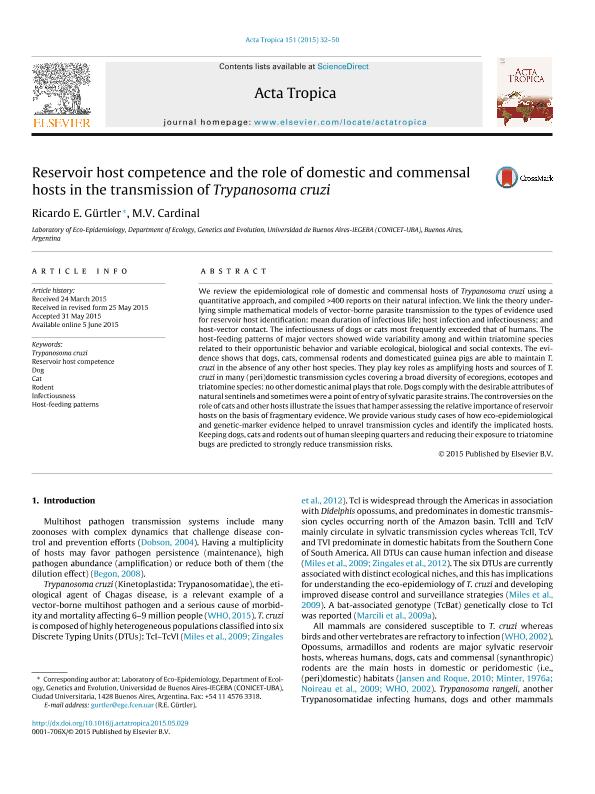Artículo
Reservoir host competence and the role of domestic and commensal hosts in the transmission of Trypanosoma cruzi
Fecha de publicación:
03/2015
Editorial:
Elsevier Science
Revista:
Acta Tropica
ISSN:
0001-706X
Idioma:
Inglés
Tipo de recurso:
Artículo publicado
Clasificación temática:
Resumen
We review the epidemiological role of domestic and commensal hosts of Trypanosoma cruzi using aquantitative approach, and compiled >400 reports on their natural infection. We link the theory under-lying simple mathematical models of vector-borne parasite transmission to the types of evidence usedfor reservoir host identification: mean duration of infectious life; host infection and infectiousness; andhost-vector contact. The infectiousness of dogs or cats most frequently exceeded that of humans. Thehost-feeding patterns of major vectors showed wide variability among and within triatomine speciesrelated to their opportunistic behavior and variable ecological, biological and social contexts. The evi-dence shows that dogs, cats, commensal rodents and domesticated guinea pigs are able to maintain T. cruzi in the absence of any other host species. They play key roles as amplifying hosts and sources of T. cruzi in many (peri)domestic transmission cycles covering a broad diversity of ecoregions, ecotopes andtriatomine species: no other domestic animal plays that role. Dogs comply with the desirable attributes ofnatural sentinels and sometimes were a point of entry of sylvatic parasite strains. The controversies on therole of cats and other hosts illustrate the issues that hamper assessing the relative importance of reservoirhosts on the basis of fragmentary evidence. We provide various study cases of how eco-epidemiologicaland genetic-marker evidence helped to unravel transmission cycles and identify the implicated hosts. Keeping dogs, cats and rodents out of human sleeping quarters and reducing their exposure to triatominebugs are predicted to strongly reduce transmission risks.
Archivos asociados
Licencia
Identificadores
Colecciones
Articulos(IEGEBA)
Articulos de INSTITUTO DE ECOLOGIA, GENETICA Y EVOLUCION DE BS. AS
Articulos de INSTITUTO DE ECOLOGIA, GENETICA Y EVOLUCION DE BS. AS
Citación
Gurtler, Ricardo Esteban; Cardinal, Marta Victoria; Reservoir host competence and the role of domestic and commensal hosts in the transmission of Trypanosoma cruzi; Elsevier Science; Acta Tropica; 151; 1; 3-2015; 32-50
Compartir
Altmétricas




